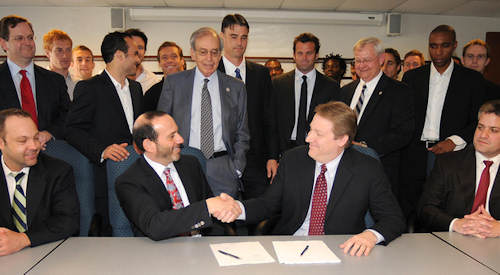
“Only if we fought just as hard to understand as we do to disagree.” -#Rehastime
Keep this in mind when it comes to how much more work is put into disagreeing versus agreeing.
The reality is that we all have disagreed with someone over someone or something. It is fine to have disagreements as long as people allow to let them serve as catalysts toward identifying issues and creating change.
Today’s inspiration is all about you getting to a point where you can learn to agree with someone. We will cover the following questions:
- What is a disagreement?
- What can cause a disagreement?
- How can you come into an agreement versus a disagreement?
Now that we have the questions, let’s find the answers!
What is a disagreement?
Merriam-Webster defines disagreement as:
-
To have a different opinion : to fail to agree.
-
To be different.
-
To not be suitable for or pleasing to someone.
A disagreement is simply where two or more people simply do not see eye-to-eye on someone or something.

What can cause a disagreement?
The causes of a disagreement can vary from person to person and from situation to situation. Spencer Greenberg gives us some insight in his post called The Seven Causes of Disagreement. I will list and give my brief take on the points below:
- Facts.
- The facts that people have when it comes to a disagreement can vary depending on the information that is presented to each person.
- When people have different sets of facts, it become difficult to be on the same page with the information.
- Definitions.
- How people use and define words can vary when someone else does not understand how or why that word was used based on what they know of the word.
- When people have different sets of definitions, it can lead to a bit of confusion on some topics to where certain words get lost in translation.
- Values.
- Values can serve as the basis on what a person knows to be right and wrong based on how they were raised and what they were exposed to over time.
- When people are unwilling to agree due to their values, it can create a stalemate.
- Signaling.
- Sometimes a person can say or do something that can signal a certain response they want to convey to someone.
- If a person is not careful with their signaling, it can provoke a response that they may not be ready to receive.
- Failures of logic.
- People tend to disagree with each other using false logic in order to prove something that may or may not happen.
- This can lead to some heated and passionate arguments that may produce ideas, but it will also be a waste of time because nothing is done with them.
- Information processing methods.
- How people gather and process the information presented in a discussion can lead to a disagreement because it may not be similar to how another person does it.
- This can lead to some anger over the fact that maybe one person can process and understand something slower and differently than another person.
- Default beliefs.
- People may find a disagreement in this situation because of the assumption that similar beliefs equal 100% agreement, but that may not be the case once you dig deeper.
- This can lead to some frustration and confusion over the fact that what a person may appear to believe and think on the surface may not be truly what another think believe and think after further investigation.
Disagreements are going to happen, but if you do not recognize what can cause it, you are only to make them grow even larger over time.

How can you come into an agreement versus a disagreement?
Granted, you may not see eye-to-eye with a person on a certain topic or issue, but it should not stand between you both coming to an agreement. Here are five ways you can come into an agreement with someone else:
- Stop and listen.
- You cannot begin to understand someone else’s perspective on someone or something if you are constantly trying rush them in order to get your point across.
- Just sit and hear the other person out without interruption nor judgement.
- When you stop and listen, you will get a better grasp of another person’s perspective.
- Ask questions to gain full comprehension.
- Not all the time will a person’s point of view be comprehensive enough for you to understand, so questions are a good way to fill in the blanks.
- Ask questions in a manner in which will allow the person to be able to answer and help you understand their point of view in a way that is comprehensive for you.
- When you ask questions to gain full comprehension, it will help you clear up any areas where you are lacking in understanding.
- Share and collaborate ideas.
- There is nothing wrong with throwing your sharing and collaborating ideas as long as you are trying to work together on a common goal.
- Come together to present ideas and opinions in a nonjudgmental manner to where every idea can be accepted and adapted to form a collective viewpoint.
- When you are sharing and collaborating ideas, you are creating an avenue to where you can have a unified and diverse perspective.
- Accept and acknowledge when someone else’s idea or view is better than yours.
- There is nothing wrong with accepting that maybe someone has a better view or perspective on something than you do.
- If someone presents something that makes sense to you to be better than what you thought, accept the thought, let them know they are right, and use the new-found thought to improve things around you.
- Doing this can show people that you are willing to be open to listening and accepting new perspectives and ideas.
- Find common ground to agree on.
- Finding common ground can be the basis towards finding more things to agree upon with other people.
- Take the time to find a connection on something in which you and the other person have a similar viewpoint or perspective on that can bring you in unison with one another.
- Finding common ground to agree on can help break down barriers and bring you and someone else closer to being on the same page on other issues and topics.
When you learn to come into an agreement, it just makes everything easier to deal with.

I encourage you to take the time to look at all of the things you have disagreed with someone else about. It may have made feel good to hold your ground and stand firm in your belief and perspective in those moments, but when it results in you not being included in team building activities and thought collectives, it may not feel as good. Let’s remember that what stands between you and someone coming into agreement is each other; when you learn how to break down your walls and not let your disagreements get in the way, nothing will stand between you and someone else agreeing to work together and accomplishing a lot as a team.

I have a few questions in which I would love for you to give some thought. Feel free to answer and comment below:
- Can you recall a moment where you found yourself in a serious disagreement with someone else?
- What was your disagreement about?
- How did you decided to go about your disagreement?
- Did you decided to remain in a disagreement or decide to work towards an agreement and why?
- What was the result of you dealing with the disagreement?
- What would you recommend to someone as to how to deal with a disagreement?
Your answers and comments can help yourself or someone else figure out this important question…
- How can you come into an agreement versus a disagreement?
-Michael J. Fite


Brilliant! If only we fought as hard to understand as we fight to disagree….
Brilliant post
LikeLiked by 1 person
Thank you for comment and appreciation Bella!
LikeLiked by 1 person
I love this. It seems like there are some people who just love to disagree, though.
LikeLiked by 1 person
Thank you for your comment and insight Robin! There are some people love to disagree simply because they love to see what other people think. What matters is what we do with those moments in terms of put to use the different opinions and beliefs.
LikeLike
I try to always respect other opinions. But yes, sometimes disagreements happen, that’s for sure. But I always attempt to remain civil.
LikeLiked by 1 person
Thank you for your comment and insight Amber! I am appreciative that you do try to respect and be civil towards others. It shows that you are doing your best to find common ground among other people.
LikeLike
Listening is a key thing. To often we forget to hear the other side of the story.
LikeLiked by 1 person
Thank you for your comment and insight Mom! I am glad you brought up listening because it can clear up a lot of differences and issues presented in communication.
LikeLike
The first picture is SO true. I really enjoyed reading this post.
LikeLiked by 1 person
Thank you for your comment and appreciation Melanie!
LikeLike
Well written Michael. I see it all the time, it’s so easy to disagree and/or judge rather than try your hardest to understand.
LikeLiked by 1 person
Thank you for your comment and insight Krystel! I agree with about how easy it is to disagree and/or judge because of a person’s prejudice about a particular person or thing.
LikeLike
Really good ways to handle both situations! I’m putting them in practice
LikeLiked by 1 person
Thank you for your comment Amy! Let me know how they work out for you.
LikeLike
I am loving that quote above. A little understanding never hurt anybody, in fact it will do you good. I think it’s important that we try to listen, understand, and have an open mind when it comes to the opinions of others.
LikeLiked by 1 person
Thank you for your comment and insight Elizabeth! Having an open mind to understand things can do a lot of good when we are trying to be one page.
LikeLike
I think also taking a break and coming back to it can be helpful. It makes you realise the relationship is more important than the point and although you may not ‘agree’, you can agree to disagree.
LikeLiked by 1 person
Thank you for your comment and insight Laura! I do agree that taking a break can be helpful because you can have time to process and think through what all has been said.
LikeLike
It is hard sometimes to disagree! It is so important in a relationship to talk about disagreements!
LikeLike
Thank you for your comment and insight Jenny! I agree with you that we must talk about disagreements in relationships because that is an effective means of finding out what the issues are and how to make things work.
LikeLike
I hate confrontations. And sometimes, even though I am right. I just give up. I dont like confrontation. It decreases my energy.
LikeLiked by 1 person
Thank you for your comment and insight Ashley! I am not confrontational as well because of the negativity that can come from it. The true challenge is to use the confrontation to find common ground, which is definitely not easy.
LikeLike
What great advise! It is hard when some people like to fight and nothing you do will change that.
LikeLiked by 1 person
Thank you for your comment and insight allaboutbabysworld! When you have people who just like to fight, you just have to take yourself away and try to understand them to the best of your ability. What matters most is that you both can agree to be peaceful regardless of how different you may be from the other person.
LikeLike
This is a great post. I think people would rather argue and disagree than listen and try to understand the other person.
LikeLiked by 1 person
Thank you for your comment and insight Taty! It is important to change the mindset of wanting to argue and disagree into one that wants to listen and understand because it can truly make the difference in finding common ground and peace!
LikeLike
I always try to listen to the opinions of other people. Another perspective can be a good thing, even if you end up agreeing to disagree.
LikeLiked by 1 person
Thank you for your comment and insight April! It is good to listen to other people’s opinions as long as you are able to find that common ground, even if it is agreeing to disagree.
LikeLike
Not being able to agree all of the time is certainly not the end of the world. A lot of people think it is though, that’s for sure.
LikeLiked by 1 person
Thank you for your comment and insight Rosey! You bring up a great point that is not the end of the world if you do not agree all of time because that is apart of human nature.
LikeLike
Communication is so important. Also listening to the other person is key to turn a disagreement into an argument.
LikeLiked by 1 person
Thank you for your comment and insight Marielle! Communication and listening are very important if we are to find how to reach common ground with someone.
LikeLike
It’s so important to respect each other and their opinions.
LikeLiked by 1 person
Thank you for your comment and insight Aziel! I agree that we must show respect because that is one way we can break down the barriers that may keep us all from finding common ground.
LikeLike
Very nice topic. I love that quotes too! Respect is the important thing I guess. Stay calm and talk about it well. I’m sure everything can be fixed by communication.
LikeLiked by 1 person
Thank you for your comment and insight Ayesha! Communication is important as long as we are calm and can show respect towards one another.
LikeLike
Sadly, I don’t think this is something my ex and I will ever be able to do.
LikeLiked by 1 person
I am sorry to hear that Jess! We can only hope that one day, you and your ex will see eye-to-eye on at least one thing.
LikeLike